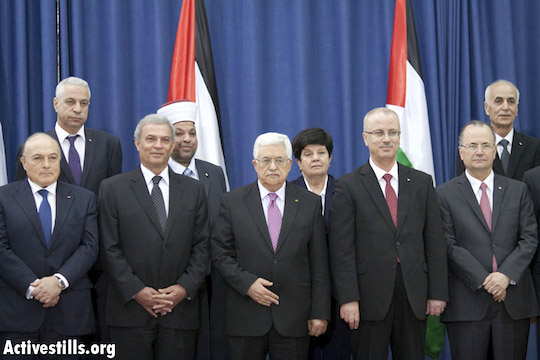Swearing in of technocratic government is a first step in ending a seven-year rift between Hamas and Fatah. Israel takes punitive measures against the inclusion of Hamas.
A technocratic Palestinian unity government was sworn in on Monday, a first step toward ending a seven-year rift between rival factions Hamas and Fatah in the Gaza Strip and West Bank, respectively.
The government is by design temporary until new Palestinian elections can be held and Hamas is included in the Palestinian Liberation Organization.
Israel was expected to adopt punitive measures against the Palestinians in response to the inclusion of Hamas, which it considers to be a terrorist organization. In response to the preliminary unity government agreement in April, Israel halted all ministerial ties to the Palestinian Authority. In an act that has been deemed economic warfare, Israel also said it would stop accepting shekel deposits from Palestinian banks; the shekel is the main currency in the occupied Palestinian territories.
On Monday, following the actual formation of the technocratic unity government, Israel was expected to announce further sanctions. The Israeli government was set to officially end peace negotiations with the Palestinians, stop the transfer of most taxes that Israel collects on behalf of the Palestinians and cut off all contact with the Palestinian government, save for security coordination.
Update (7:20 p.m.):
The Israeli security cabinet on Monday afternoon said that it would hold the Palestinian Authority responsible for “all actions that harm the security of Israel,” including rockets from the Gaza Strip.
The cabinet also said Israel “[will] act, including in the international arena, against the participation of terrorist organizations in [Palestinian] elections.” In other words, Israel will attempt to dictate who is eligible to participate in Palestinian democracy.
PA President Mahmoud Abbas, responded to the threat of sanctions and boycotts: “We will not stand idle for the collective punishment against us and we will use all the means, diplomatic, political means, to respond to it.”

Israel also denied entry to the West Bank to three of the new Palestinian ministers who live in the Gaza Strip. Israel controls all Palestinian border crossings to the West Bank and one of the two crossings to the Gaza Strip.
Israel is currently holding eight members of the Palestinian Legislative Council in prison without trial, under administrative detention. At various times in recent years, some 50 PLC members have been imprisoned by Israel.
The United States and other members of the international community are demanding that a new Palestinian government declare its intention to adhere to what are known as the Quartet principals. The principals are: recognizing Israel, rejecting violence and abiding by all existing agreements, to which Abbas said last month the a unity government would be committed.
A major sticking point in negotiations between Fatah and Hamas was the fate of Hamas’s independent security forces in the Gaza Strip.
In what it said was its last-ever meeting last Tuesday, the Hamas cabinet in Gaza said that it, “is ready to hand over its full responsibilities to the unity government,” the Associated Press reported. It was not clear what that meant for the Hamas security forces, which are separate from its military wing, the Izz a-Din a-Qassam Brigades.
The assumption is that Egypt’s deteriorating relations with Hamas — since the coup that ousted President Morsi — was one of the major factors that led to Fatah-Hamas reconciliation. Additionally, the continued rule of Gen. Abdel Fattah el-Sisi, who is hostile to Hamas, will only increase the Gazan government’s interests in reaching a deal with Ramallah.
Related:
More than just the PA at stake in Palestinian reconciliation
True Palestinian reconciliation must include refugees
Why Fatah-Hamas reconciliation might just work this time


